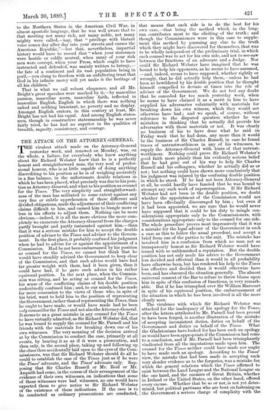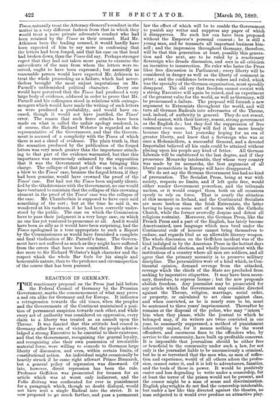THE ATTACK ON THE ATTORNEY-GENERAL.
THE virulent attack made on the Attorney-General yesterday week, and renewed on Monday, was, on the whole, a, failure, for everybody who knew anything about Sir Richard Webster knew that he is a perfectly honest and straightforward man, the very soul of profes- sional honour, who is as little capable of doing anything discrediting to his position as he is of weighing accurately in a fine balance, in the unfortunate double relations in which he has been placed, what precisely was due to his posi- tion as Attorney-General, and what to his position as counsel for the Times. The very simplicity and straightforward- ness of the man has militated to some extent' against any very fine or subtle apprehension of these different and divided obligations, made the adjustment of their conflicting claims difficult to him, and caused him to bungle more or less in his efforts to adjust them. Nothing can be more obvious,—indeed, it is all the more obvious the more com- pletely we exonerate the Attorney-General from the charges partly brought and partly insinuated against him,—than that it was a serious mistake for him to accept the double position of adviser to the Times and adviser to the Govern- ment. In the first place, it probably confused his judgment when he had to advise for or against the appointment of a Commission. Had he not been embarrassed by his position as counsel for the Times, we cannot but think that he would have steadily advised the Government to keep clear of the Commission, and that such advice would have had far greater weight with them, had it been given, than it could have had, if he gave such advice in his rather equivocal position. In the next place, when the Commis- sion was sitting, and he acting as counsel for the Times, his sense of the conflicting claims of his double position undoubtedly confused him ; and, to our minds, he has made far more concession to the views of those who, in spite of his brief, want to hold him to the position of representing the Government, rather than of representing the Times, than he ought to have made, or would have made had he been may counsellor the Times and not also the Attorney-General. It seems to us a great mistake in any counsel for the Times to have virtually admitted, as Sir Richard Webster did, that he was bound to supply the counsel for Mr. Parnell and his friends with the materials for breaking down one of his own witnesses. The very meaning of the decision arrived at by the Commission to conduct the case, primarily at all events, by hearing it as as if it were a prosecution, and then only, in the second place, taking up and following up the clues thus accidentally laid open to the eyes of the Com- missioners, was that Sir Richard Webster should do all he could to establish the case of the Times just as if he were the Times' advocate, and the Times' advocate only. Sup- posing that Sir Charles Russell or Mr. Reid or Mr. Asquith had come, in the course of their arrangement of the evidence of their own witnesses, on indications that some of those witnesses were bad witnesses, no one would have expected them to give notice to Sir Richard Webster of the existence of these indications. If the case is to be conducted as ordinary prosecutions are conducted, that means that each side is to do the best for his own case,—that being the method which in the long- run contributes most to the eliciting of the truth ; and though the Commissioners were in this case to supple-. ment this method by pursuing any clue to the truth which they might have discovered for themselves, that was to be wholly independent of the preliminary trial, in which each counsel was to act for his own side, and not to see-saw between the functions of an advocate and a Judge. Nor could Sir Richard Webster have imagined that he was bound to help his opponents, as he seems to have assumed, —and, indeed, seems to have supposed, whether rightly or wrongly, that he did actually help them,—unless he had been so bewildered by his double position that he thought himself compelled to deviate at times into the role of adviser of the Government. We do not feel any doubt that he conceded far too much yesterday week, when he seems to have claimed it as a merit in him to have supplied his adversaries voluntarily with materials for breaking down his own witness, which they would not otherwise have had ; and we speak, of course, without reference to the disputed question whether he was mistaken in thinking that he actually did provide his adversaries with those materials or not. It was clearly no business of his to have done what he said on Friday week that he had done, any more than it would be the business of Sir Charles Russell, in case he found traces of untrustworthiness in any of his witnesses, to supply the Attorney-General with hints of that untrust- worthiness. Nothing could prove Sir Richard Webster's good faith more plainly than his evidently serious belief that he had gone out of his way to help Sir Charles Russell and his colleagues, whether he actually did so or not ; but nothing could have shown more conclusively that his judgment was injured by the confusing double position in which he stood. If be had not been Attorney-General at all, he could hardly have fancied that he was bound to- attempt any such work of supererogation. If Sir Richard Webster had not been in the double position, we doubt whether the appointment of the Commission would not have been effectually discouraged by him ; but even if it had been appointed, we are sure that he would never have supposed that it could be his duty to mingle con- siderations appropriate only to the Commissioners, with considerations appropriate only to the counsel for one side. The whole procedure proves most impressively that it was a mistake for the legal adviser of the Government in such a case as this to follow the usual precedent, and accept a brief from one of the parties to the suit. The mistake has involved him in a confusion from which no man not as transparently honest as Sir Richard Webster would have issued with so unblemished a reputation. But the double position has not only made his advice to the Government less decided and effectual than it would in all probability have otherwise been, but has rendered his help to the Times less effective and decided than it would otherwise have been, and has obscured the situation generally. The almost universal consent of the Bar to refuse to throw blame upon him in spite of this confusion of functions, is very remark-. able. But if he has triumphed over Sir William Harcourt in spite of his equivocal position, the embarrassment of the situation in which he has been involved is all the more clearly seen.
The virulence with which Sir Richard Webster was attacked for the inadequacy of his apology for the Times, after the letters attributed to Mr. Parnell had been proved to have been forged, is another illustration of the mistake of accepting inconsistent duties, duties on behalf of the Government and duties on behalf of the Times. What the Gladstonians have looked for has been such an apology as would have been appropriate if the Commission had come to a conclusion, and if Mr. Parnell had been triumphantly vindicated from all the imputations made upon him. The counsel for the Times neither could have made nor ought to have made such an apology. According to the n11'14d view, the mistake that had been made in accepting such very slender evidence as to the forgeries, was a mistake for which the general relations which the Times affirmed to exist between the Land League and the National League on the one hand, and the enemies of Great Britain, whether in Ireland or the United States, on the other hand, offered every excuse. Whether that be so or not, is not yet deter- mined, but political partisans who are bent on fastening on the Government a serious charge of complicity with the Times, naturally treat the Attorney-General's conduct in the matter in a very different fashion from that in which they would treat a mere private advocate's conduct who had been retained by the Times as their counsel. Had Mr. Atkinson been the leading counsel, it would hardly have been expected of him to say more in confessing that the letters had been forged, and that his case on that head had broken down, than the Times did say. Perhaps stronger regret that they had not taken more pains to examine the antecedents of the man from whom the letters were re- ceived, ought to have been expressed ; but assuredly no reasonable person would have expected Mr. Atkinson to treat the whole proceeding as a failure, which had never- theless brought the most unjust imputations on Mr. Parnell's unblemished political character. Every one would have perceived that the Times had produced a very large body of evidence, adduced in order to prove that Mr. Parnell and his colleagues stood in relations with outrage- mongers which would have made the writing of such letters as were produced a probability, and would have ex- cused, though it would not have justified, the Times' error. The reason that such fierce attacks have been made on what is called the unfair apology rendered, is, of course, that Sir Richard Webster is regarded as the representative of the Government, and that the Govern- ment is accused of a complicity with the Times of which there is not a shred of evidence. The plain truth is, that the sensation produced by the publication of the forged letters was very much greater than the importance attach- ing to that part of the evidence warranted, but that this importance was enormously enhanced by the supposition that it was the Government which was bringing this charge. The collapse of that part of the case is, of course, a blow to the Times' case, because the forged letters, if they had been genuine, would have crowned the proof of the Times' ease. But had not the Times been unjustly identi- fied by the Gladstonians with the Government, no one would have ventured to maintain that the collapse of this crowning element in the proof of the Times' case was the collapse of the case. Mr. Chamberlain is supposed to have once said something of the sort ; but at the time he said it, we wondered at his rashness, if he had been correctly under- stood by the public. The case on which the Commission have to pass their judgment is a very large case, on which no one has yet ventured to pronounce at all. And it would have been as silly as it would have been surprising, had the Times apologised in a tone appropriate to such a Report by the Commissioners as would have furnished a complete and final vindication of Mr. Parnell's fame. The Govern- ment have not suffered as much as they might have suffered from the errors that have been committed. But that is due more to Sir Richard Webster's high character and the respect which the whole Bar feels for his simple and honourable nature, than to the prudence and circumspection of the course that has been pursued.



















































 Previous page
Previous page